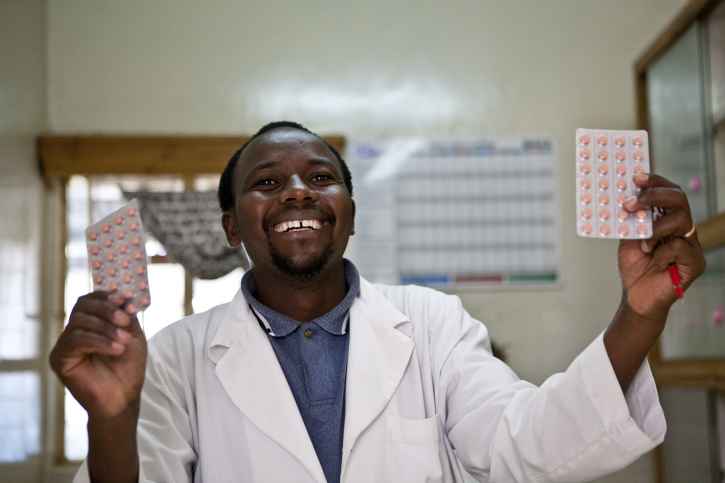You are here:
Strengthening local structures

A tanzanian pharmacist holds two blister packs aloft. © action medeor/B. Breuer
For more than 50 years action medeor has been promoting wider access to essential medicines through projects.
An adequate supply of medicines which are both quality-assured and affordable is a key element of any health system and a fundamental component of the right to health. The following points are essential for an adequate supply of medicines and form the basis of rational drug use in developing countries:
- Research and development of suitable drugs
- Production of pharmaceuticals using adapted technology
- Medicines Regulations
- Import, storage and distribution of drugs
In all these areas, action medeor possesses and is able to offer the required expertise either in the form of advisory services or as an implementing organisation. Our "pharmaceutical consulting" section is a separate department within action medeor which develops and implements pharmaceutical projects and training programmes together with our collaboration partners. We depend not only on our own pharmacists and scientists, but also on a well-developed network of external experts.
action medeor’s concept of supporting local structures in the drug supply chain is embedded in national, regional and international standards. We comply with state regulations and cooperate with national and regional stakeholders. We support and compliment regional programmes, for example in the case of the harmonisation of the pharmaceutical sector in the East African Community which is sponsored by the GIZ.
Research and development of suitable drugs
In almost all developing countries there is a lack of trained professionals - the pharmaceutical sector is no exception. action medeor has been cooperating for years for example with universities in Dar es Salaam / Tanzania (Muhimbili University) and Kumasi / Ghana (Kwame Nkrumah Unversity) to support the training of pharmacists. This is achieved on the one hand by establishing pharmaceutical training and research laboratories, educating students in production and analysis and on the other hand by promoting university research and providing scholarships for specific projects of talented students.
Production of pharmaceuticals using adapted technology
Various manufacturers in developing countries produce essential medicines for the local and regional markets and thus improve the access to medicines. However, the quality of these drugs is often unsatisfactory. Many of these manufacturers frequently have insufficient technical, financial and human resources and only few are able to produce according to international regulations of pharmaceutical manufacturing.
action medeor coordinates training programmes (funded through partners like the GIZ) for employees working in the pharmaceutical industry on the subject of Good Manufacturing Practice (GMP) - including topics such as sterile medicinal products and other special dosage forms. We also advise, design and construct modern production facilities and help with process optimisation for essential drugs and development laboratories. Our regular on-site inspections and consultations assist manufacturers in gradually attaining international production and quality standards.
Medicines Regulations
In industrialised countries, the state-run Drug Regulatory Authorities play an important role in ensuring the quality of the supply of medicinal products. An increasing number of developing countries have recognized that monitoring the pharmaceutical market is essential for a functioning drug supply system. This is particularly important with regard to preventing sub-standard and/or counterfeit medicines. For example an increasing number of African States are introducing stringent drug approval processes. Notably, this is also happening on a regional level, for example in the East African Community.
action medeor strengthens the local drug regulatory authorities by providing trainings in the areas of drug registration, inspection and monitoring of manufacturers. Furthermore, action medeor supports setting up bioanalytical laboratories and drug control laboratories for the use of the regulatory authorities.
Import, storage and distribution of drugs
In many countries medicines are procured and distributed by central governmental or para-governmental institutions. However, the market is fragmented, especially with regard to the supply in areas not covered by the international programmes for HIV / AIDS, malaria and tuberculosis.
Setting up an alternative supply system complementing the existing national one is a successful strategy already applied in Kenya, Uganda and Tanzania. action medeor supports the setting-up of regional non-profit wholesalers: distribution centres have already been established in Tanzania (since 2005) and Malawi (2013).